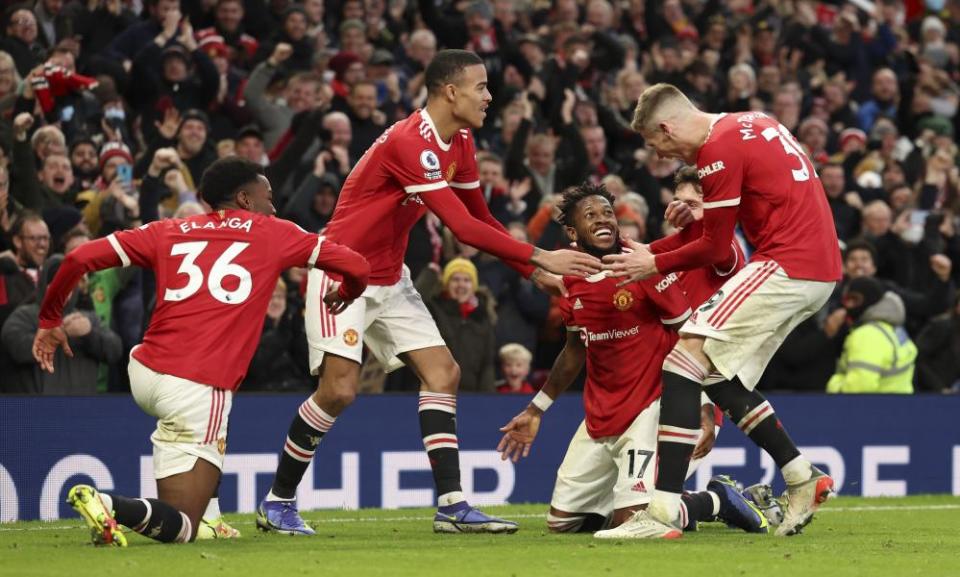Fred delivers fresh start but not redemption for Manchester United

New managers get the benefit of the doubt. Even language breaks their way. A 1-0 win against Crystal Palace that might have been described as streaky under Ole Gunnar Solskjær becomes a hard-fought three points under Ralf Rangnick. While Solskjær showed “indecision” in delaying his substitutions, here Rangnick confidently “bided his time”. A fortnight ago, this was a performance that would have “papered over the cracks”. Now, it is a “platform to build on”.
And so for all the temptation to read the early runes, to derive immutable learnings from these 90 minutes against limited opposition, it’s probably worth pointing out at the outset that none of this really means anything yet. It was possible, if you were that way inclined, to glimpse in this game the rebirth of United as an elite pressing team, the redemption of Fred, the end of the road for Aaron Wan-Bissaka and Donny van de Beek. In reality it was three points and a fresh start, and how painfully United were in need of both.
Related: Rangnick wins first Manchester United game as Fred sinks Crystal Palace
Fred’s winning goal, a curling shot with 13 minutes to go, felt symbolically like the turning of a page, a slate being wiped clean. And yet the need for United to go to the market in search of a central midfielder has not waned. A clean sheet for David de Gea felt like a welcome balm after the knockabout chaos of the 3-2 win over Arsenal on Thursday night. And yet the need for United to tighten up their defensive structures and perhaps reinforce at centre-half remains as pressing as ever.
What has changed is the outlook. We can talk about Rangnick’s tactics and his technical approach and his ideas on the game, but you can’t tell me that the same players who looked so bereft and disinterested towards the end of the Solskjær era have been coached into competence in the space of one training session. Instinctively, and in its simplest form, most footballers already know how to press. It’s just that under Solskjær, they rarely felt like they had to. Now the terms of engagement have shifted, it turns out that United’s players could run after all.
For a time, anyway. If the first half hour showed United at their effervescent best, hounding and harrying and getting their shots away, then it felt like they spent the next 45 minutes paying for their early exertions. The energy levels sagged, Palace began to get a grip of the midfield, and a team unchanged from Thursday night began to look a little short of ideas. This was surely a game management issue – picking your moments, coordinating your efforts, knowing when to charge and when not to charge – and you imagine Rangnick will be working on this at length.
The result was a slightly uneven performance: 11 shots in the first 33 minutes and just five over the rests of the game, a grand total of four completed passes into the Palace penalty area in the second half. After beginning the game in full hero mode, Cristiano Ronaldo faded a touch as the game progressed. United deserved the win on the strength of their first-half play but had Jordan Ayew not missed from three yards barely a minute before Fred’s goal, they might easily have lost.
“Football is about minimising the coincidence factor and having control and gaining control,” Rangnick had said in advance of this game, and here perhaps was a reminder that United are still some way short of that goal.
Controlling the game for long periods still seems beyond them. But there were encouraging performances from Diogo Dalot and Alex Telles in the full-back positions, perhaps the biggest immediate point of difference on a tactical level. Telles won the ball back more often than any player on the pitch, and while Luke Shaw will probably return when he is fit, no such comfort is available to Wan-Bissaka, who now appears to have been usurped by the more adventurous Dalot.
As for Fred, it was a happy afternoon’s work that could well be the start of something. United’s lack of leadership and direction in that area of the pitch has frequently left him overburdened, forced to create and destroy and run and tackle and press and sit all at once. A more bespoke role – giving him the cover to break up play and join attacks – would probably suit him. But again, this is a project that needs time.
And in a way, this is the whole point: we still don’t really know how this is going to work, or if it will work at all. After all, Rangnick’s career tells us that he doesn’t indulge stars, he makes them. What happens when the high priest of pressing meets a world-class striker who won’t press? What happens when the ultimate long-term project builder takes a short-term job at a club and in a league fixated on snap judgments?
Either way, it should be worth finding out. The fixture calendar has been kind to United: there are three months until they play Manchester City in March, and the hardest league game in that period is probably West Ham at home. And so one of the most calamitous episodes in the history of the club has ended with them three points off the Champions League places with one of the world’s leading coaching minds at the helm. If this is failure, most clubs would crave a bit of it.

 Yahoo Sport
Yahoo Sport 





































